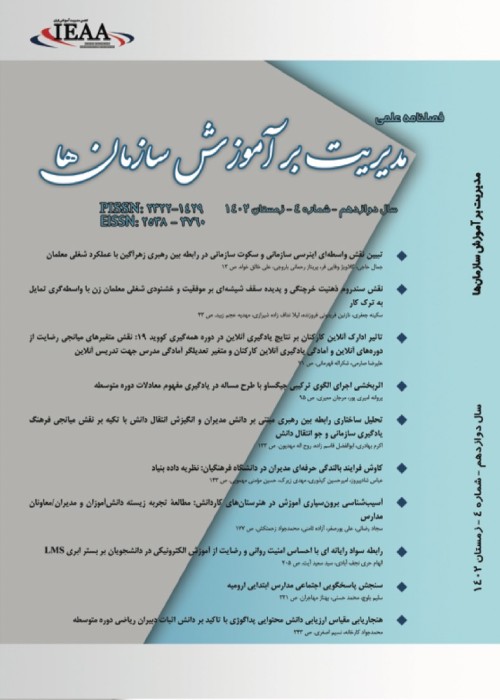Investigating the Precedents and Consequences of Accepting E-Learning in Students' Educational and Research Goals
The aim of this study was to investigate the antecedents and consequences of accepting e-learning in students. This research is applied in terms of purpose and nature and in terms of data collection is a descriptive correlation based on structural equation modeling. The statistical population of the study consisted of all undergraduate students of Shiraz University of Medical Sciences in the number of 4064 people who were selected as a sample through Krejcie and Morgan table, 351 people through proportional stratified random sampling method. To measure the research variables, questionnaires of students' characteristics, students' attitudes toward e-learning, system quality, content quality, teachers' characteristics, knowledge management, e-learning acceptance, behavioral intention and actual use of e-learning system were used. The validity of the questionnaires was confirmed by logical (formal and content) and structural (confirmatory factor analysis) validity methods and the reliability by Cronbach's alpha were estimated. The data analysis method was performed at two levels of descriptive and inferential (structural equation model) which was implemented through SPSS 24 and Lisrel 8.8 software. Based on the research results, students 'characteristics, students' attitudes toward e-learning, system quality, content quality, faculty characteristics and knowledge management as a precursor and behavioral intention and actual use of e-learning system as a consequence of accepting e-learning Is an emphasis. The highest correlation coefficient was observed between system quality and e-learning acceptance (ß= 0.91) and the lowest correlation between content quality and e-learning acceptance (ß = 0.42). Also, the highest correlation coefficient was observed for e-learning acceptance consequences. Behavioral intention (ß= 0.72) was observed between e-learning acceptance and possible outcome. According to the obtained results, it can be said that any increase in the variables of student characteristics, students' attitudes toward e-learning, system quality, content quality, faculty characteristics and knowledge management as antecedents with increasing In students' e-learning acceptance and any increase in the e-learning acceptance variable will be accompanied by an increase in the amount of behavioral intention and actual use of the e-learning system as consequences. Therefore, it seems necessary to pay attention to the antecedents and consequences of accepting e-learning when launching and using the e-learning system.
- حق عضویت دریافتی صرف حمایت از نشریات عضو و نگهداری، تکمیل و توسعه مگیران میشود.
- پرداخت حق اشتراک و دانلود مقالات اجازه بازنشر آن در سایر رسانههای چاپی و دیجیتال را به کاربر نمیدهد.




